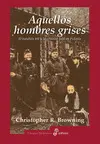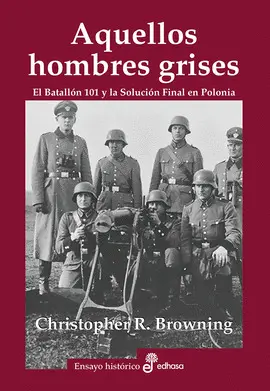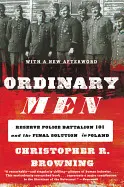Ordinary Men
Reserve Police Battalion 101 And The Final Solution In Poland
Christopher R. Browning
Brief Description:In the early hours of July 13, 1942, the men of Reserve Police Battalion 101, a unit of the German Order Police, entered the Polish Village of Jozefow. They had arrived in Poland less than three weeks before, most of them recently drafted family men too old for combat service--workers, artisans, salesmen, and clerks. By nightfall, they had rounded up Jozefow's...
Sinopsis
Brief Description:
In the early hours of July 13, 1942, the men of Reserve Police Battalion 101, a unit of the German Order Police, entered the Polish Village of Jozefow. They had arrived in Poland less than three weeks before, most of them recently drafted family men too old for combat service--workers, artisans, salesmen, and clerks. By nightfall, they had rounded up Jozefow's 1,800 Jews, selected several hundred men as "work Jews," and shot the rest--that is, some 1,500 women, children, and old people. Most of these overage, rear-echelon reserve policemen had grown to maturity in the port city of Hamburg in pre-Hitler Germany and were neither committed Nazis nor racial fanatics. Nevertheless, in the sixteen months from the Jozefow massacre to the brutal Erntefest ("harvest festival") slaughter of November 1943, these average men participated in the direct shooting deaths of at least 38,000 Jews and the deportation to Treblinka's gas chambers of 45,000 more--a total body count of 83,000 for a unit of less than 500 men. Drawing on postwar interrogations of 210 former members of the battalion, Christopher Browning lets them speak for themselves about their contribution to the Final Solution--what they did, what they thought, how they rationalized their behavior (one man would shoot only infants and children, to "release" them from their misery). In a sobering conclusion, Browning suggests that these good Germans were acting less out of deference to authority or fear of punishment than from motives as insidious as they are common: careerism and peer pressure. With its unflinching reconstruction of the battalion's murderous record and its painstaking attention to the social background and actions of individual men, this unique account offers some of the most powerful and disturbing evidence to date of the ordinary human capacity for extraordinary inhumanity.
Jacket Description/Back:
Ordinary Men is the true story of Reserve Police Battalion 101 of the German Order Police, which was responsible for mass shootings as well as roundups of Jewish people for deportation to Nazi death camps in Poland in 1942. Browning argues that most of the men of RPB 101 were not fanatical Nazis but ordinary middle-aged, working-class men who committed these atrocities out of a mixture of motives, including the group dynamics of conformity, deference to authority, role adaptation, and the altering of moral norms to justify their actions. Very quickly three groups emerged within the battalion: a core of eager killers, a plurality who carried out their duties reliably but without initiative, and a small minority who evaded participation in the acts of killing without diminishing the murderous efficiency of the battalion whatsoever.
While the book discusses a specific reserve unit during World War II, the general argument Browning makes is that most people are susceptible to the pressure of a group setting and committing actions they would never do of their own volition.
Ordinary Men is a powerful, chilling, and important work with themes and arguments that continue to resonate today.
Review Quotes:
"A staggering and important book, a book that manages without polemic to communicate at least an intimation of the unthinkable." -- Chicago Tribune
"Helps us understand, better than we did before, not only what they did to make the Holocaust happen but also how they were transformed psychologically from the ordinary men of [the] title into active participants in the most monstrous crime in human history." -- New York Times Book Review
"It is the care with which Browning examines the evidence, as well as the soberness of his conclusions, that gives this work such power and impact." -- Kirkus Reviews
"A remarkable--and singularly chilling--glimpse of human behavior. . .This meticulously researched book...represents a major contribution to the literature of the Holocaust." -- Newsweek
Publisher Marketing:
"A remarkable--and singularly chilling--glimpse of human behavior. . .This meticulously researched book...represents a major contribution to the literature of the Holocaust."--Newsweek
Christopher R. Browning's shocking account of how a unit of average middle-aged Germans became the cold-blooded murderers of tens of thousands of Jews--now with a new afterword and additional photographs.
Ordinary Men is the true story of Reserve Police Battalion 101 of the German Order Police, which was responsible for mass shootings as well as round-ups of Jewish people for deportation to Nazi death camps in Poland in 1942. Browning argues that most of the men of RPB 101 were not fanatical Nazis but, rather, ordinary middle-aged, working-class men who committed these atrocities out of a mixture of motives, including the group dynamics of conformity, deference to authority, role adaptation, and the altering of moral norms to justify their actions. Very quickly three groups emerged within the battalion: a core of eager killers, a plurality who carried out their duties reliably but without initiative, and a small minority who evaded participation in the acts of killing without diminishing the murderous efficiency of the battalion whatsoever.
While this book discusses a specific Reserve Unit during WWII, the general argument Browning makes is that most people succumb to the pressures of a group setting and commit actions they would never do of their own volition.
Ordinary Men is a powerful, chilling, and important work with themes and arguments that continue to resonate today.
Contributor Bio:Browning, Christopher R
Christopher R. Browning is professor of history at Pacific Lutheran University in Tacoma, Washington. He is a contributor to Yad Vashem's official twenty-four-volume history of the Holocaust and the author of two earlier books on the subject.
Comentarios
Sé el primero en comentar este libroArtículos relacionados



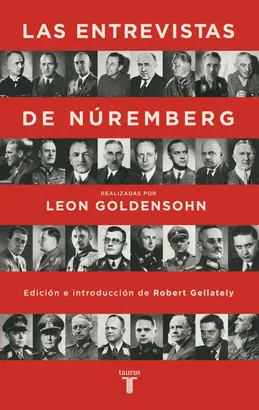
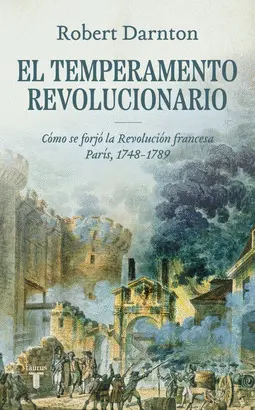

Otros libros del autor
